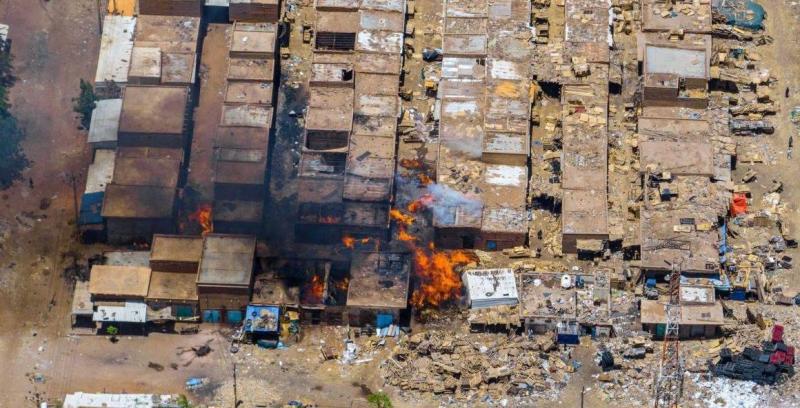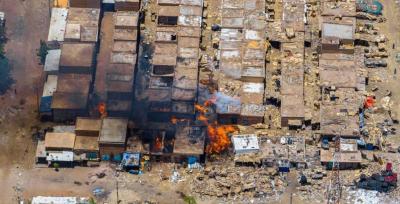Fighting has intensified in several areas of Khartoum after the ceasefire expired, with new outbreaks of violence in North Darfur state resulting in at least 40 deaths.
Residents reported that areas of the Sudanese capital experienced shelling and fierce clashes on Monday, with reports of chaos spreading in Khartoum and the Darfur region after more than seven weeks of conflict between the army and rapid support forces. Witnesses told Reuters that neighborhoods in central Omdurman are subjected to public looting daily without any intervention to stop it, and clashes and bombardment continue. Other residents from eastern Khartoum stated that the rapid support forces have spread throughout the capital's neighborhoods, taking complete control and engaging in extensive looting. The ceasefire between the Sudanese army and the paramilitary rapid support forces began on May 22 and ended on Saturday night. The ceasefire, mediated by Saudi Arabia and the United States, had slightly reduced the intensity of the fighting and allowed limited humanitarian aid to reach affected areas, but, like previous ceasefire announcements, it was marred by multiple violations. Talks aimed at extending it collapsed on Friday. Footage showed thick black smoke rising in the sky over the capital on Sunday. Fighting was also reported in several other areas, including central and southern Khartoum and Bahri.
Outside the capital, fighting erupted in the Darfur region in the west, which is already suffering from prolonged conflict and severe humanitarian crises. Witnesses reported that fierce fighting erupted on Friday and Saturday, leading to chaos in the town of Kutum, a commercial center and one of the main towns in North Darfur. The Fasher Hospital received the first batch of injured from the rapid support militia assaults on civilians in Kutum. The "Darfur Lawyers Association" stated that at least 40 people were killed, and dozens were injured, some of whom are residents of the Kasab camp that shelters displaced individuals from previous unrest. The army denied that the rapid support forces had taken control of the city. Witnesses noted that a military plane crashed in Omdurman, one of the three cities forming the greater capital area.
The Saudi-American mediation states that they are in daily contact with the delegations of the army and rapid support forces, which remain in Jeddah despite the suspension of ceasefire extension talks last week. The two countries confirmed in a statement that "the consultations focus on ways to facilitate humanitarian aid and to reach an agreement on the steps both parties must take in the near future before resuming talks in Jeddah." Rapid Support Forces leader Mohamed Hamdan Daglo, known as Hemetti, indicated in a Facebook post that he discussed the overall situation in Sudan during a phone call with Saudi Foreign Minister Faisal bin Farhan, concerning ongoing Saudi-American mediation efforts.
The past few days have witnessed the first rainfall of the year, marking the beginning of a season that will continue until October, leading to flooding and increased risks of waterborne diseases. The rainfall may complicate relief efforts that have already been hampered by delays due to bureaucratic procedures and logistical challenges. The bloody power struggle in Sudan began on April 15, causing a major humanitarian crisis that displaced more than 1.2 million people within the country and caused 400,000 to flee to neighboring countries. Ongoing fighting has resulted in widespread looting and destruction in the capital, the collapse of health services, and disruptions to electricity and water supply, alongside food shortages.




